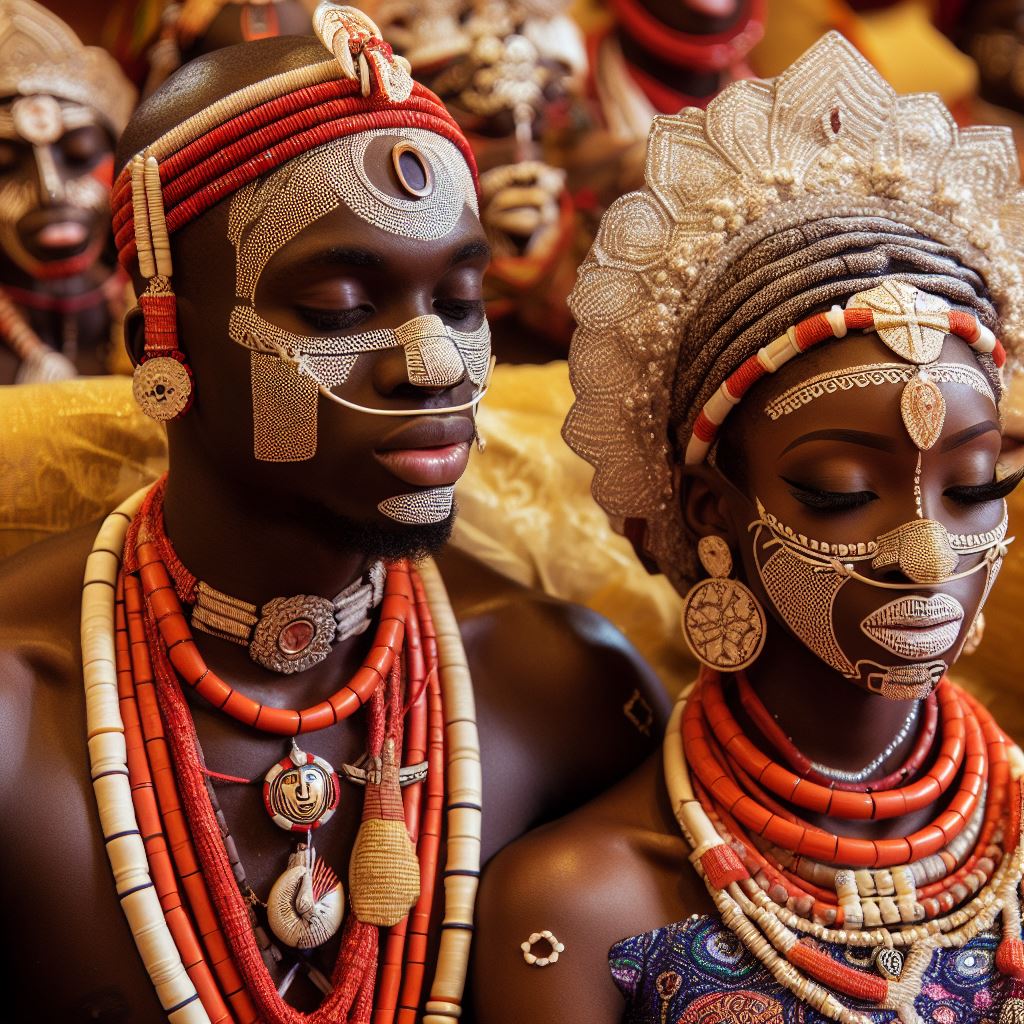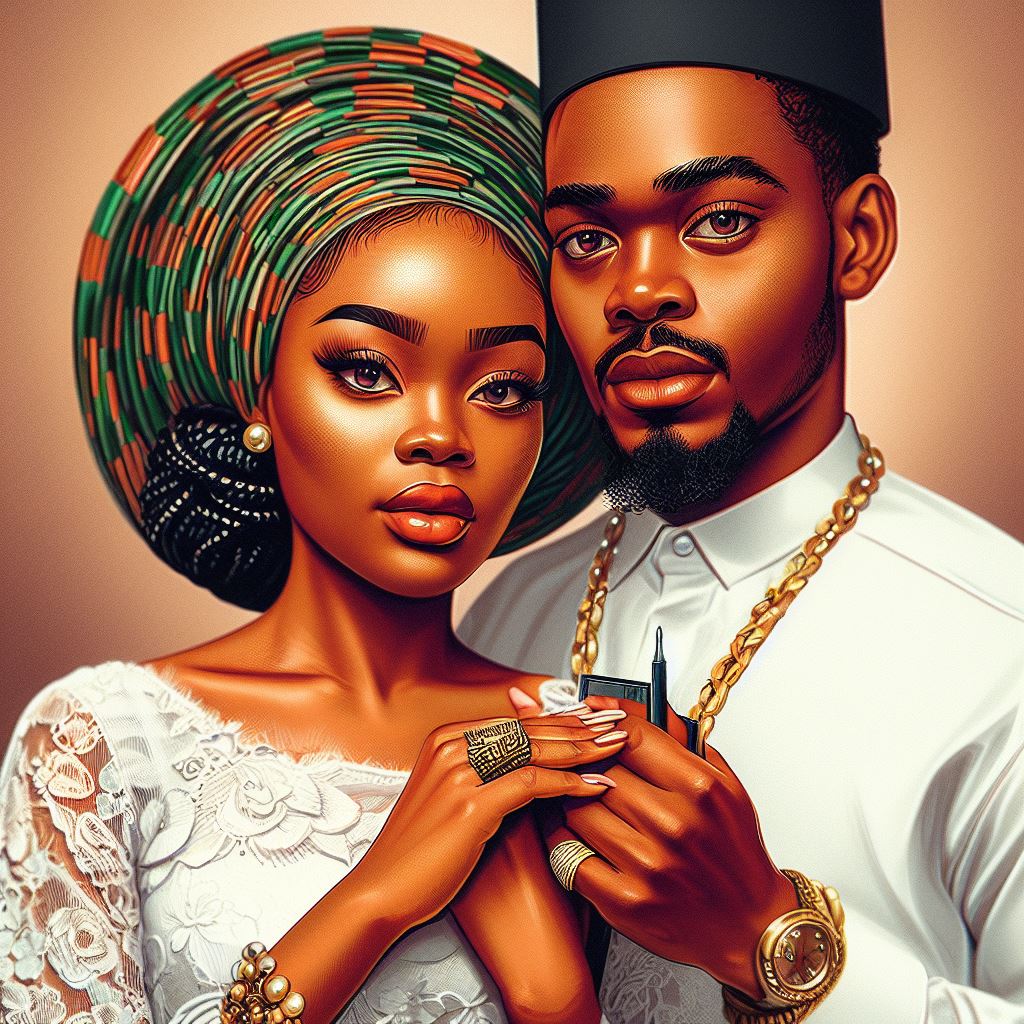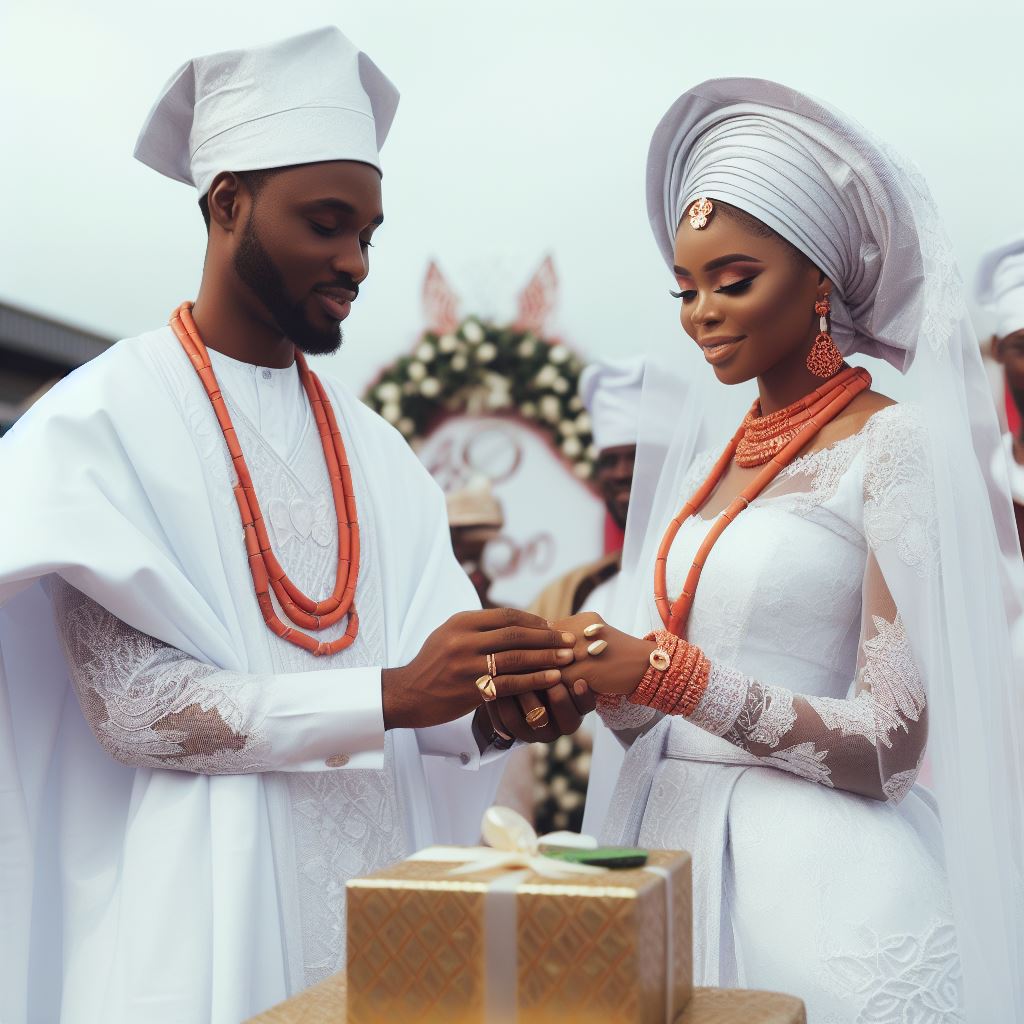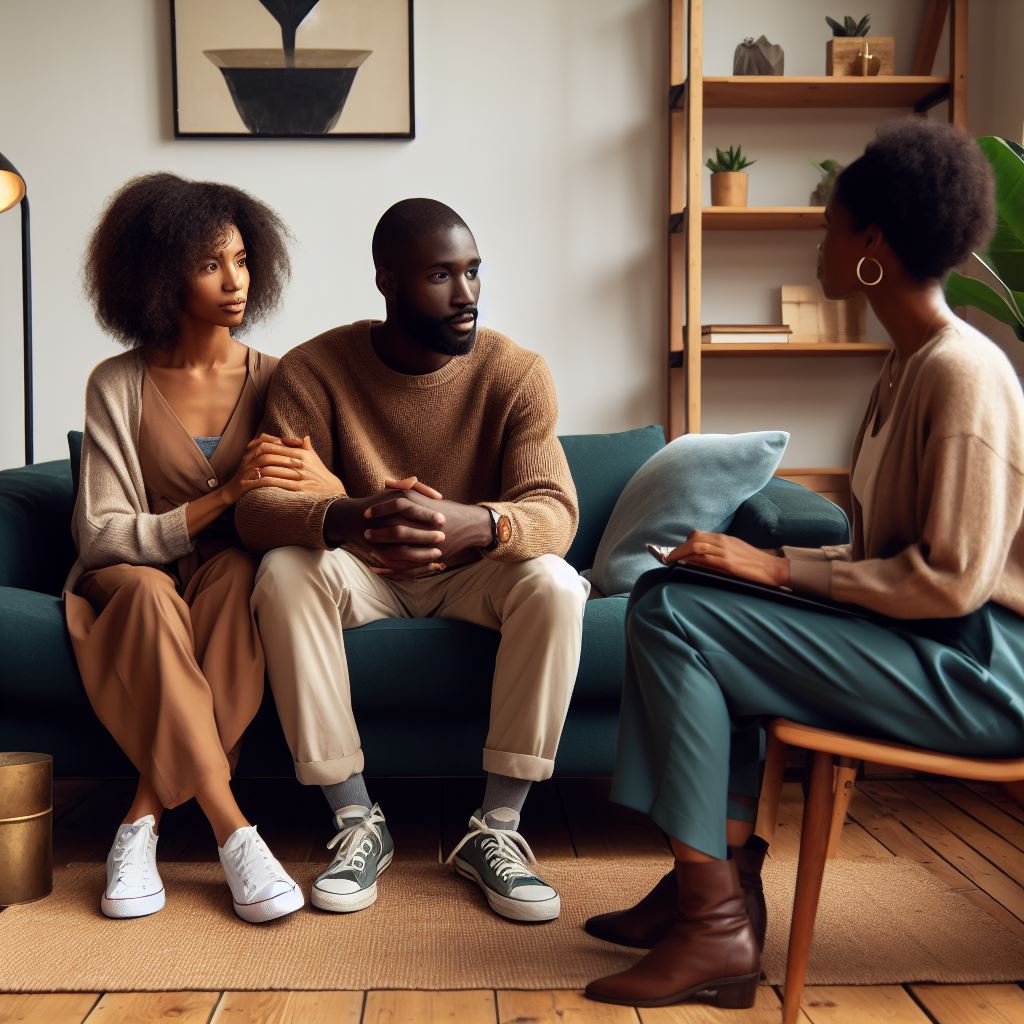Introduction
A. Significance of Wedding Vows
Wedding vows, the sacred promises exchanged between couples, are the foundation of a lasting marriage worldwide.
B. Focus on Traditional Nigerian Wedding Vows
In this section, we turn our attention to the captivating realm of traditional Nigerian wedding vows.
Nigeria, a country rich in culture and diversity, boasts a tapestry of vibrant wedding traditions.
C. Understanding and Preserving Cultural Traditions
- Cultural Significance: Traditional wedding vows reflect Nigeria’s diverse ethnic groups, with each having its unique customs and rituals.
- Family and Community Bond: These vows strengthen the bonds not just between the couple but within families and communities.
- Preservation of Heritage: Understanding these traditions is crucial for preserving Nigeria’s rich cultural heritage.
- Unity and Love: Traditional vows emphasize unity, love, respect, and commitment, fostering a strong foundation for married life.
In this exploration, we’ll uncover the beauty and significance of traditional Nigerian wedding vows, shedding light on the essence of these enduring customs.
Exploring Nigerian Wedding Vows
Nigerian wedding vows are deeply rooted in historical traditions that have evolved over centuries.
These vows vary between different ethnic groups in Nigeria, reflecting the country’s rich cultural diversity.
One of the defining features of Nigerian wedding vows is the emphasis on family and community.
Unlike Western wedding vows that focus primarily on the couple, Nigerian vows encompass the entire community.
A. Historical background of traditional wedding vows in Nigeria
The historical background of traditional wedding vows in Nigeria can be traced back to ancient customs.
In the pre-colonial era, marriage ceremonies played a central role in affirming social ties and kinship networks.
Wedding vows were a way to solidify the bond between families and ensure the continuation of traditions.
B. Diversity of ethnic groups and how it reflects in wedding traditions
Each ethnic group in Nigeria has its unique wedding traditions that are reflected in the vows.
For example, Yoruba weddings often involve the pouring of libations to honor ancestors and seek their blessings.
The Igbo people, on the other hand, exchange “Okpu Agu” or lion’s teeth as a symbol of strength and fidelity.
Hausa weddings place importance on the consent of both families and vows often include promises to uphold Islamic values.
C. Family, community, and cultural values within vows
Nigerian wedding vows go beyond individual love and commitment, encompassing broader cultural values.
Family plays a central role in these vows, with the couple pledging to respect and care for their extended families.
Community is also a key element, as the couple promises to contribute positively to their community’s well-being.
Respecting cultural values is emphasized, with vows highlighting the importance of traditions and customs.
Nigerian wedding vows often include references to the couple’s ethnic heritage and pride in their cultural identity.
These vows serve as a reminder of the couple’s roots and the legacy they will pass down to future generations.
When exchanging vows, the couple seeks the blessings of their parents and older family members.
These blessings are seen as crucial for the success and longevity of the marriage.
As Nigeria continues to evolve, so do its wedding traditions and the vows spoken during these ceremonies.
Many couples today combine traditional elements with modern elements, creating unique and personalized vows.
Despite this evolution, the core values of family, community, and cultural pride remain at the heart of Nigerian wedding vows.
These vows serve as a reminder of the couple’s commitment not only to each other but also to their heritage.
Nigerian wedding vows are a testament to the richness and diversity of Nigeria’s cultural tapestry.
They celebrate love, unity, and the importance of maintaining ancestral traditions in a rapidly changing world.
Whether it is through pouring libations or exchanging lion’s teeth, these vows hold deep meaning and significance.
They are a solemn promise to honor the past, live in the present, and create a future steeped in cultural heritage.
Read: Rekindling the Flame: Passionate Prayers for Nigerian Anniversaries
Common Elements in Traditional Nigerian Wedding Vows
When it comes to Traditional Nigerian Wedding Vows, there are several common elements that are often included.
These elements emphasize the importance of unity, commitment, and cultural heritage within the vows:
A. Unity and Mutual Support
- The couple vows to support and stand by each other through thick and thin.
- They promise to work together as a team and face any challenges that come their way.
- Unity is emphasized as the foundation of a strong and successful marriage.
B. Commitment and Loyalty
- The couple expresses their commitment and loyalty to each other.
- They promise to remain faithful and dedicated throughout their married life.
- This demonstrates their understanding of the importance of trust and faithfulness.
C. Celebrating and Upholding Cultural Heritage
- Nigerian wedding vows often include references to cultural traditions and customs.
- These vows honor and celebrate the couple’s cultural heritage and background.
- It serves as a reminder to preserve and pass on their traditions to future generations.
Overall, Traditional Nigerian Wedding Vows go beyond the individual couple and focus on the unity of families, cultural heritage, and the commitment they are making to each other.
These vows reflect the deep-rooted values and traditions of Nigerian culture.
Read: Celebrating Marital Bliss: A Compilation of Nigerian Anniversary Prayers
Types of Traditional Nigerian Wedding Vows
A. Overview of major ethnic groups and their wedding vow customs
- The Yoruba, Igbo, and Hausa ethnic groups have unique wedding vow customs in Nigeria.
- Wedding vows hold great importance in Nigerian culture and are deeply rooted in tradition.
- Each ethnic group has its own set of vows, which reflect their customs, values, and beliefs.
B. Yoruba wedding vows: significance and common phrases
- Yoruba wedding vows are a blend of seriousness, respect, and poetic expressions.
- The groom and bride make promises to each other, emphasizing loyalty, love, and lifelong commitment.
- Common Yoruba phrases in wedding vows include “Mo l’owo re,” meaning “I choose you,” and “Mo fe ran re,” meaning “I love you.”
C. Igbo wedding vows: unique traditions and symbolic phrases
- Igbo wedding vows are characterized by their detailed rituals and symbolic phrases.
- The bride and groom exchange vows in the Igbo language, pledging their love, fidelity, and respect.
- Popular Igbo phrases in wedding vows include “Onye nkem,” meaning “my own,” and “Obi m o,” meaning “my heart belongs to you.”
D. Hausa wedding vows: traditional elements and sacred promises
- Hausa wedding vows are deeply rooted in Islamic traditions and customs.
- The couple pledges to fulfill their religious responsibilities and honor each other’s rights.
- Important phrases in Hausa wedding vows include “Ka taimake ni,” meaning “you support me,” and “Kun samu ni,” meaning “you complete me.”
In short, Nigerian weddings are a vibrant celebration of love, culture, and tradition.
The wedding vows exchanged by couples from different ethnic groups showcase the richness and diversity of Nigerian customs.
Whether it’s the poetic expressions of Yoruba vows, the symbolism of Igbo vows, or the religious undertones of Hausa vows, these traditions reflect the deep-rooted values of loyalty, love, and commitment cherished by Nigerians.
The unique wedding vow customs of the Yoruba, Igbo, and Hausa ethnic groups add to the beauty and significance of Nigerian weddings, making them truly memorable and special.
Read: Essential Tips for Strengthening Marriages in Nigeria

Meanings and Symbolism in Traditional Nigerian Wedding Vows
A. Deep dive into the symbolism behind common phrases
- “For better for worse, in sickness and in health, till death do us part.” These words signify the unbreakable bond between the couple, regardless of the challenges they may face.
- “With this ring, I thee wed.” The exchange of rings symbolizes the eternal nature of the union, as the circular shape has no beginning or end.
- “I promise to love, honor, and cherish you.” This pledge highlights the importance of love, respect, and care in a marriage.
- “I promise to be faithful and loyal.” Fidelity is considered paramount in Nigerian culture, and this vow reinforces the commitment to remain devoted to one another.
- “I promise to provide for you and our future children.” The bride and groom promise to support each other emotionally, financially, and materially in order to create a stable and nurturing environment for their family.
- “I promise to always be there for you.” This vow signifies the unconditional support and companionship the couple promises to offer each other throughout their lives.
B. The spiritual aspects embedded in the vows
- “In the presence of God and these witnesses.” Nigerian weddings are often conducted in churches, and invoking the presence of God underscores the importance of divine blessings in the union.
- “May God bless this union and guide us.” The couple seeks God’s guidance and blessings for their marriage, acknowledging that their love and commitment alone are not sufficient without divine intervention.
- “As a reflection of Christ and the church.” Nigerian wedding vows often draw parallels between the love between the couple and the spiritual relationship between Christ and the church, highlighting the sanctity of marriage.
C. Connecting wedding vows and long-lasting marriages
- Nigerian wedding vows emphasize the seriousness of marriage and the lifelong commitment that is expected from both partners.
- These vows serve as a reminder of the responsibilities and obligations each partner must uphold to ensure the success and longevity of the marriage.
- They provide a foundation for building trust, communication, and understanding within the marriage, which are essential for a lasting and fulfilling relationship.
In fact, traditional Nigerian wedding vows carry profound meanings and symbolism.
They reflect the cultural values, spiritual beliefs, and social expectations surrounding marriage.
By understanding the significance behind these vows, couples are reminded of the depth of their commitment and the qualities needed to nurture a strong and enduring union.
Read: Echoes of Everlasting Love: Traditional Nigerian Prayers for Anniversaries
Delve into the Subject: Children and Marriage Strains: How Counseling Offers Solutions
Preserving and Modernizing Nigerian Wedding Vows
Traditional Nigerian wedding vows are an integral part of the country’s rich cultural heritage.
They reflect the values, beliefs, and aspirations of the Nigerian people, highlighting the significance of marriage and the sacred bond between two individuals.
However, in today’s rapidly changing world, preserving these traditional wedding vows has become a challenge.
A. Challenges in Preserving Traditional Wedding Vows
- Language Barrier: As Nigeria is a diverse nation with over 500 ethnic groups, each having its own language and dialects, preserving traditional wedding vows can be difficult.
- Lack of Documentation: Many traditional wedding vows have been passed down orally through generations, making it challenging to preserve the original wording and meaning.
- Western Influence: With the rise of Western culture and practices, there is a growing inclination to adopt Western-style wedding vows, causing traditional ones to be forgotten.
- Generational Gap: Younger generations are often more open to modern ideas and may not prioritize keeping traditional wedding vows intact.
B. The Impact of Modernization and Globalization on Wedding Vows
The advent of modernization and globalization has had both positive and negative effects on Nigerian wedding vows.
- Increased Awareness: Modernity and globalization have brought increased awareness about the value of preserving traditional culture, including wedding vows.
- External Influences: The exposure to different cultures through globalization has given Nigerians the opportunity to integrate new elements into their wedding vows.
- Loss of Authenticity: However, the influence of Western culture can sometimes dilute the authenticity and originality of traditional wedding vows.
- Expanding Horizons: Globalization has opened up new possibilities for Nigerians to incorporate unique elements from other cultures into their wedding vows.
C. Importance of Adapting and Integrating New Elements While Respecting Traditions
In the face of these challenges, it is crucial to strike a balance between preserving traditional Nigerian wedding vows and incorporating modern elements.
This enables the continuation of cultural heritage while embracing the changing times.
- Embracing Translation: Making traditional vows accessible to all by translating them into widely spoken languages can bridge the language barrier.
- Recording and Documentation: Efforts should be made to document traditional wedding vows accurately to ensure their preservation for future generations.
- Education and Awareness: Creating awareness among younger generations about the importance and beauty of traditional wedding vows can foster a sense of pride and encourage their preservation.
- Personalization: Allowing couples to personalize their wedding vows within the framework of tradition can create a meaningful and unique experience.
- Integration of New elements: Adapting and integrating new elements into traditional wedding vows can make them more relevant and appealing to younger generations.
- Celebrating Diversity: Recognizing and respecting the diverse cultural practices within Nigeria can help preserve the uniqueness and authenticity of traditional wedding vows.
In essence, Nigerian wedding vows are a significant part of the country’s cultural identity.
While challenges exist in preserving them, it is essential to find ways to adapt and modernize while still keeping the core values intact.
The integration of new elements can ensure the continued relevance and longevity of traditional wedding vows for generations to come.
Conclusion
Traditional Nigerian wedding vows hold significant cultural value and showcase the diversity present in Nigeria.
They symbolize the deep-rooted customs, beliefs, and values that shape the marriage ceremony.
It is important for couples and attendees to appreciate and embrace these cultural heritage in wedding ceremonies.
By doing so, they can foster a sense of unity and engender respect for one another’s background.
Love and commitment are at the core of any successful marriage, and these traditional vows remind us of the importance of these values.
They remind couples to remain faithful, supportive, and devoted to one another throughout their journey together.
Furthermore, the inclusion of cultural traditions and customs in weddings can promote cultural unity and understanding.
It allows couples to honor their heritage while also creating unique and memorable experiences for themselves and their loved ones.
In a world that sometimes feels dominated by modern influences, it is essential to preserve and celebrate our cultural roots.
Traditional wedding vows provide a beautiful avenue through which couples can do this.
Ultimately, they serve as a powerful reminder that love knows no boundaries, and that embracing cultural diversity only strengthens the foundation of a lasting and fulfilling marriage.




